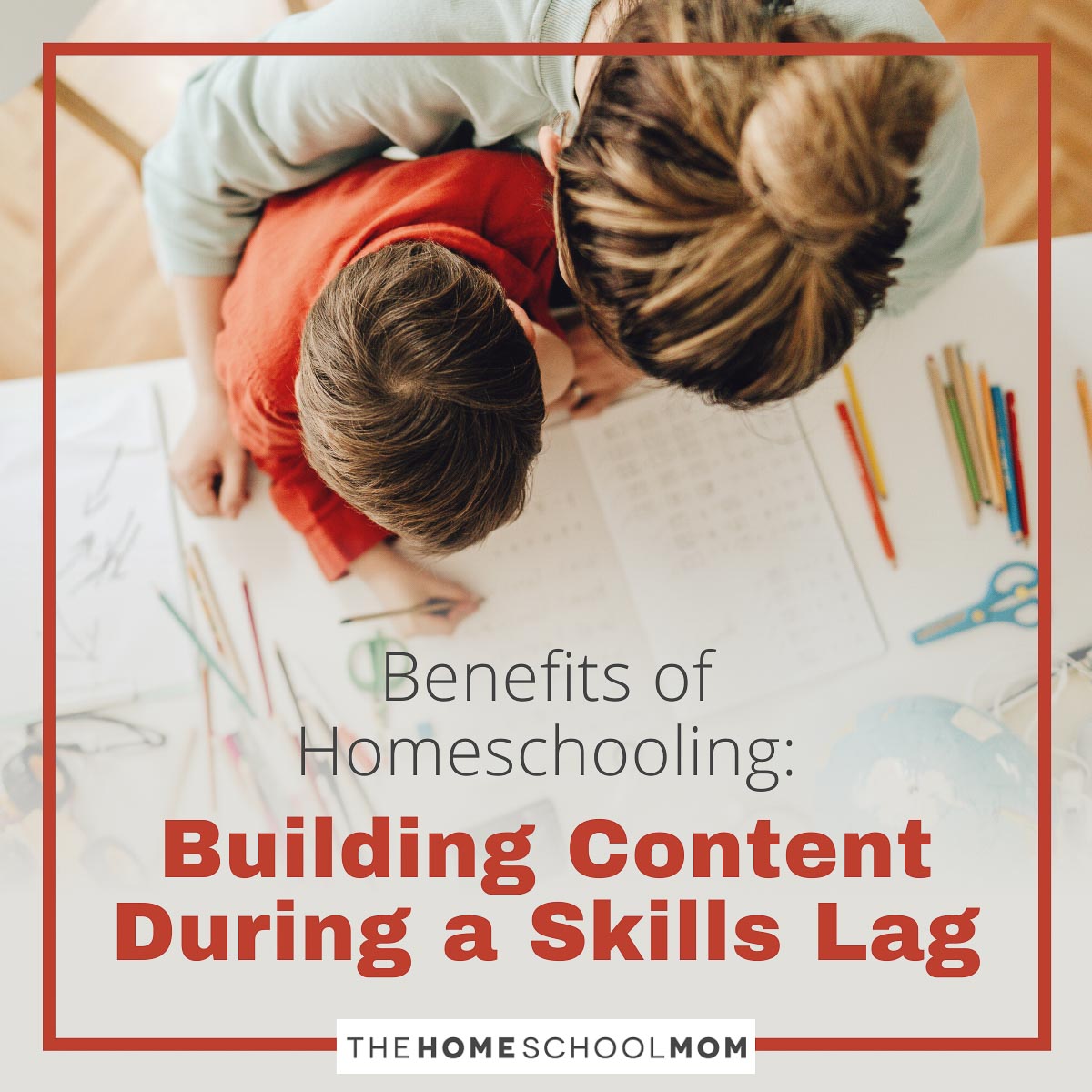Much has been made of the academic benefits of homeschooling, but often without getting specific about how those benefits actually work.
One of the most important benefits of homeschooling I've witnessed over the years has been the way homeschooling allows kids to build knowledge during times when some of their specific academic skills might be seen as "behind" (by school standards).
I call this "building content during a skills lag".

Typically, school children are asked to learn to read during kindergarten and first grade, and to build on that skill in second grade. As early as third grade, and definitely by fourth grade, schools make a big change in what they ask of students. Rather than just asking children to learn to read, they ask children to read to learn.
This means children in many public schools are asked by third and fourth grade to read chapters from textbooks in specific subject areas, especially science and social studies.
They are expected to be able to comprehend facts from their reading and to begin to take reading-based tests, such as multiple choice and short answer tests, so teachers can evaluate their history and science learning.
They may also be asked to write out explanations to test questions and to write reports.
Many parents and teachers agree that some children at these ages often lack fluency in their reading, and they may struggle with both the composition and handwriting aspects of creating written responses.
We begin to see many school children become disaffected in their public school classrooms at about this point if their busy teachers must rely on these generally accepted techniques-reading textbooks and written testing-for advancing in learning and evaluating knowledge or memorization in other subject areas.
In a strict "grade level" atmosphere, individual children who are developing on their own schedule may get behind not only in language arts skills but in important historical and scientific knowledge as well.
This is one reason why there is so much pressure on early acquisition of language arts skills in public education. Kids who are behind in their reading, composition, and handwriting skills are quickly at a disadvantage in their other subjects because reading and writing become such dominant instructional techniques so early on.
Pretty soon, some kids' sense of being unsuccessful in all aspects of school can overwhelm them, and strategies to improve reading "deficiencies" may backfire as children are impacted by the system pushing them to acquire skills they simply aren't developmentally ready to acquire.
Homeschooling is different.
First, homeschoolers are typically more comfortable with later readers and later-developing fluency in reading and writing. While public educators speak of dire consequences of late reading, homeschoolers find that given developmental time and rich pre-reading support, children who read later are not an a disadvantage in the long run.
Of course, homeschoolers are wise to be on the lookout for delays and learning deficiencies that interventions may help -- but in general, homeschoolers are frequently comfortable with a slower pace of developing reading and writing skills than public school educators can be.
(Of course, homeschooling also has its share of precocious early readers, too, but that's another story.)
Second, homeschooling parents are uniquely suited to help their children continue to acquire knowledge, even if their children are not yet able to learn through reading alone.
Parents can customize learning so it works for each child and for their family. Teachers in schools have a large number of children to work with and frequently don't have the freedom or flexibility to change the homeschool curriculum or tailor their own lessons.




 A popular speaker at homeschooling conferences, business groups, and parents’ groups, Jeanne Potts Faulconer homeschooled her three sons in North Carolina, Mississippi, and Virginia for twenty years. Holding her Master of Arts degree in Communication, Jeanne conducted portfolio evaluations for Virginia homeschoolers for evidence of progress for many years. Jeanne is a former college faculty member, former editor for several publications, news correspondent for WCVE, and former director of Brave Learner Home. She is the contributing editor for TheHomeSchoolMom newsletter and writes the popular Ask Jeanne column addressing homeschool parents' questions here at TheHomeSchoolMom.
A popular speaker at homeschooling conferences, business groups, and parents’ groups, Jeanne Potts Faulconer homeschooled her three sons in North Carolina, Mississippi, and Virginia for twenty years. Holding her Master of Arts degree in Communication, Jeanne conducted portfolio evaluations for Virginia homeschoolers for evidence of progress for many years. Jeanne is a former college faculty member, former editor for several publications, news correspondent for WCVE, and former director of Brave Learner Home. She is the contributing editor for TheHomeSchoolMom newsletter and writes the popular Ask Jeanne column addressing homeschool parents' questions here at TheHomeSchoolMom.
My son has an iep and Is disabled he cannot read at all.If you have some inside to laws or education please let me know.
Hi Natalie,
In the U.S., your son is entitled to a public education that meets his needs. If he has an IEP, since that's a school term, I am assuming he is in school. While we have some ideas on homeschooling a child who has been behind in school, we are not experts on public school's legal requirements or getting a public school to comply.
If the school is not following his IEP or it is not adequate, you will need to consult with the school. The WrightsLaw Special Education page has more information for parents of public school students in this situation.
If you are homeschooling, you may use special programs yourself or privately hire a specially trained tutor who can help address his needs. Actually, you can supplement by doing this at home even if he is attending school, but you would be paying out of pocket for services that the school does not agree to provide.
Good luck getting this sorted.
Jeanne